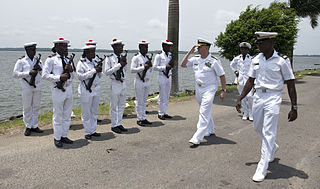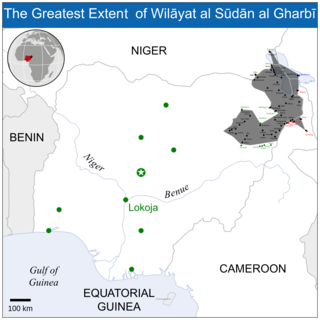| |||||
| Decades: | |||||
|---|---|---|---|---|---|
| See also: | Other events of 2014 List of years in Cameroon | ||||
The following lists events that happened during 2014 in Cameroon .
| |||||
| Decades: | |||||
|---|---|---|---|---|---|
| See also: | Other events of 2014 List of years in Cameroon | ||||
The following lists events that happened during 2014 in Cameroon .

Boko Haram, officially known as Jamā'at Ahl as-Sunnah lid-Da'wah wa'l-Jihād, is an Islamist jihadist organization based in northeastern Nigeria, which is also active in Chad, Niger, northern Cameroon, and Mali. In 2016, the group split, resulting in the emergence of a hostile faction known as the Islamic State's West Africa Province.

Gwoza is a local government area of Borno State, Nigeria. Its headquarters are in the town of Gwoza, a border town "about 135 kilometres South-East of Maiduguri." The postal code of the area is 610.

The Boko Haram insurgency began in July 2009, when the militant Islamist and jihadist rebel group Boko Haram started an armed rebellion against the government of Nigeria. The conflict is taking place within the context of long-standing issues of religious violence between Nigeria's Muslim and Christian communities, and the insurgents' ultimate aim is to establish an Islamic state in the region.

Abu Mohammed Abubakar al-Sheikawi was a Nigerian militant who was the leader of Boko Haram, an Islamist extremist organization based in northeastern Nigeria, from 2009 to 2021. He served as deputy leader to the group's founder, Mohammed Yusuf, until Yusuf's execution in 2009.

The Vanguard for the Protection of Muslims in Black Africa, better known as Ansaru and less commonly called al-Qaeda in the Lands Beyond the Sahel, is an Islamic fundamentalist Jihadist militant organisation originally based in the northeast of Nigeria. Originally a faction of Boko Haram, the group announced in 2012 that it had pledged allegiance to al-Qaeda and was independent. Despite this, Ansaru and other Boko Haram factions continued to work closely together until the former increasingly declined and stopped its insurgent activities in 2013. The group was revived in 2020, and has been involved in the Nigerian bandit conflict
Timeline of the Boko Haram insurgency is the chronology of the Boko Haram insurgency, an ongoing armed conflict between Nigerian Islamist group Boko Haram and the Nigerian government. Boko Haram have carried out many attacks against the military, police and civilians since 2009, mostly in Nigeria. The low-intensity conflict is centred on Borno State. It peaked in the mid-2010s, when Boko Haram extended their insurgency into Cameroon, Chad and Niger.
The Konduga massacre took place in Konduga, Borno State, Nigeria on 11 February 2014. The massacre was conducted by Boko Haram Islamists against Christian villagers. At least 62 people were killed.

On the night of 14–15 April 2014, 276 mostly Christian female students aged from 16 to 18 were kidnapped by the Islamic terrorist group called Boko Haram from the Government Girls Secondary School at the town of Chibok in Borno State, Nigeria. Prior to the raid, the school had been closed for four weeks due to deteriorating security conditions, but the girls were in attendance in order to take final exams in physics.
On the night of 5–6 May 2014, Boko Haram militants attacked the twin towns of Gamboru and Ngala in Borno State, northeastern Nigeria. About 310 residents were killed in the 12-hour massacre, and the town was largely destroyed.

Between 23 and 25 June 2014, a series of attacks occurred in central Nigeria. On 23–24 June, gunmen attacked a number of villages in Kaduna State, killing around 150 people. The attack was blamed on Fulani tribesmen. On 25 June 2014, a bomb exploded at the Emab Plaza in the national capital of Abuja, killing at least 21 people. In response to the bombing, the Nigerian military raided two militants camps on 26 June, killing more than 100 people.

Religious violence in Nigeria refers to Christian-Muslim strife in modern Nigeria, which can be traced back to 1953. Today, religious violence in Nigeria is dominated by the Boko Haram insurgency, which aims to establish an Islamic state in Nigeria. Since the turn of the 21st century, 62,000 Nigerian Christians have been killed by the terrorist group Boko Haram, Fulani herdsmen and other groups. The killings have been referred to as a silent genocide.
The following lists events from 2014 in Nigeria.
The following lists events that happened in 2013 in Nigeria.
On 13 December 2014, 172–185 villagers in the village of Gumsuri were kidnapped, suspected to be by Boko Haram militants. 32–35 people were killed.
The following lists events that happened during 2015 in Nigeria.

The following lists events that happened during 2015 in Cameroon.

Starting in late January 2015, a coalition of West African troops launched an offensive against the Boko Haram insurgents in Nigeria.
This article contains a timeline of events from January 2015 to December 2015 related to the Islamic State of Iraq and the Levant (ISIL/ISIS). This article contains information about events committed by or on behalf of the Islamic State, as well as events performed by groups who oppose them.

The Chad Basin campaign of 2018–2020 was a series of battles and offensives in the southern Chad Basin, particularly northeastern Nigeria, which took place amid the ongoing Boko Haram insurgency. The Chad Basin witnessed an upsurge of insurgent activity from early November 2018, as rebels belonging to the Islamic State's West Africa Province (ISWAP) and Boko Haram launched offensives and several raids to regain military strength and seize territory in a renewed attempt to establish an Islamic state in the region. These attacks, especially those by ISWAP, met with considerable success and resulted in the displacement of hundreds of thousands of civilians. The member states of the Multinational Joint Task Force (MJTF), namely Nigeria, Niger, Chad, and Cameroon responded to the increased insurgent activity with counter-offensives. These operations repulsed the rebels in many areas but failed to fully contain the insurgency.

Since 2015, the border area between Burkina Faso, Mali, and Niger has been a hotbed for jihadist forces originating from Mali. The insurgency has taken place in two distinct regions of Niger. In southwest, the Islamic State in the Greater Sahara and the Nusrat al-Islam have carried out attacks in the tri-border area with Burkina Faso and Mali. Meanwhile, in the southeast, the Islamic State in the West African Province has established control in parts of southern Niger.